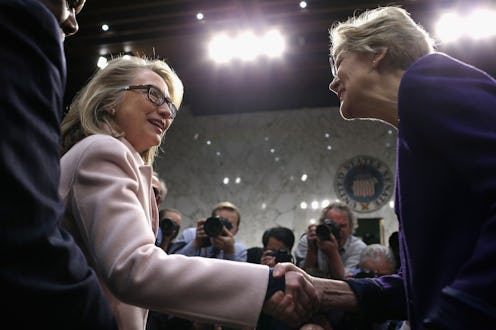News
The Importance Of A Dream Clinton-Warren Ticket
Now that Hillary Clinton has essentially clinched the Democratic presidential nomination (although it should be noted that rival Bernie Sanders has not yet conceded), she’s in the unenviable position of having to choose a running mate. The Democrats don’t have a terribly deep bench, but Sen. Elizabeth Warren has emerged as an early frontrunner for the Democratic vice presidential slot. One pleasant development in this year's veepstakes is that, by and large, the prospect of Democrats running an all-woman ticket hasn’t resulted in a widespread misogynistic backlash.
This isn’t to say there’s been no backlash at all. Donald Trump has used sexist code words to describe Warren, calling her “weak and ineffective,” while message boards across the Internet are full of proclamations that America isn’t ready for an all-woman ticket. But outside of Trump, and the putrid Internet fever swamps from which he draws his support, overt sexism hasn’t been the focal point of discussions about Warren’s vice presidential prospects.
The right-wing news site Hot Air, for example, criticized the prospect of a Clinton-Warren ticket not because it would have too many X chromosomes, but because it it would be too “socialist.” While that's an absurd misuse of the word "socialist," it's not a criticism that's rooted in sexism.. The more-mainstream National Review, meanwhile, urged the GOP not to dismiss the electoral viability of an all-woman ticket, which suggest an awareness within mainstream conservatism that maybe, America is ready for an all-female White House.
It’s been equally encouraging to watch the Warren debate unfold on the left. Democrats who oppose putting Warren on the ticket have argued that she has more power as a liberal senator than she would as vice president. They've also pointed out that a Republican governor would appoint Warren’s replacement in the Senate, thus tipping the Congressional balance in favor of the GOP.
But Democrats have not been arguing that Clinton shouldn’t choose Warren on the grounds that the country can’t handle an all-female ticket. LIkewise, liberals who support putting Warren on the ticket cite her popularity amongst Bernie Sanders supporters and ability to bring the party’s left flank into the fold — not any perceived political advantages of putting two women on the Democratic ticket. The fact that Warren is a woman has been almost a non-factor.
What all of this suggests is that the prospect that women can be competent, strong and effective leaders is becoming more and more normalized in the American political zeitgeist. The country still got a long way to go, of course, and it's embarrassing that it's taken this long to get to where we are now. But the tenor of the Warren debate does indicate that, at the very least, discernible progress has been made.
When Geraldine Ferraro became the first woman to join a major-party presidential ticket in 1984, she was asked demeaning questions like, “Do you think that in any way the Soviets might be tempted to try to take advantage of you simply because you are a woman?” That was on Meet The Press, one of the most prominent television shows in America, and Ferraro was only running to be vice president.
Now, skepticism of an all-woman ticket has been confined largely to Facebook comments, Twitter trolls and message board threads, not Wall Street Journal op-eds and TIME magazine covers. That’s not everything, but it is reason to be at least a little optimistic about the state of gender politics in American political culture.
